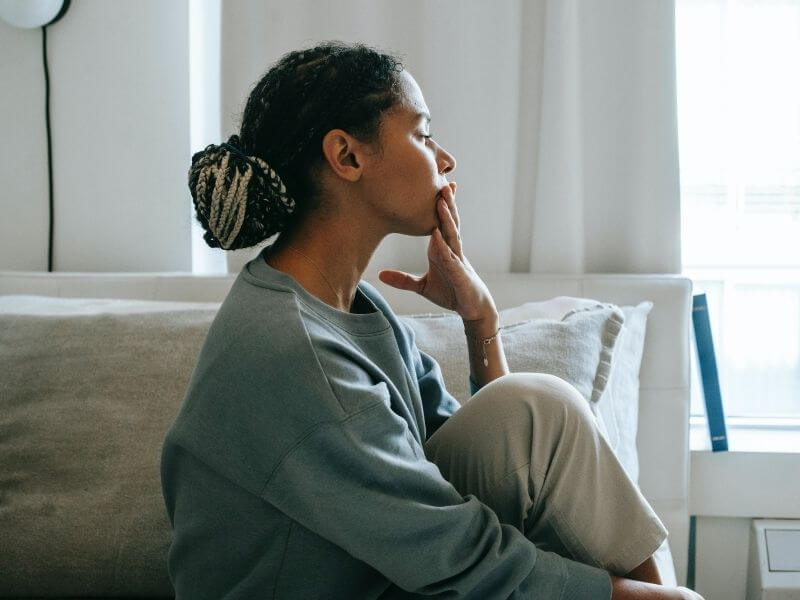If you’re one of the 10-15% of women who experience overactive bladder (OAB), then you’re all too familiar with how it can impact your quality of life.1 You may also find that it is negatively impacting your mental health.
Unfortunately, overactive bladder is linked to mental health issues like depression and anxiety. Women with this condition may therefore want to seek out professional help for both their physical and emotional symptoms related to OAB.
What Is an Overactive Bladder?
Overactive bladder refers to a combination of issues that can affect the bladder. People with the condition primarily experience frequent, sudden urges to urinate. They may also urinate involuntarily, which is called incontinence.
While we don’t fully understand this condition, we know that it happens when the muscles of the bladder contract involuntarily, regardless of whether you actually need to pee. This can be caused by nerve damage, urinary tract infections, certain medications, dementia, and weak pelvic floor muscles, among many other factors.
OAB comes with a whole host of other issues. Embarrassed by their condition, patients may limit socializing and physical activity. It can impact job performance and productivity. It can also lead to skin breakdown, sleep disturbances, fall-related injuries, more urinary tract infections, and other health concerns. In fact, patients with OAB have 84% more visits to the doctor per year than average. 2
Ultimately, OAB can have a massive impact on your quality of life and, perhaps not surprisingly, on your mental health.
All About OAB
Understanding Urinary Incontinence
Urinary incontinence is a common condition that often coexists with overactive bladder (OAB). It refers to the unintentional loss of urine, and it can manifest in different forms. Stress incontinence occurs when physical activities such as sneezing, laughing, or exercising lead to leakage. Urge incontinence, on the other hand, is characterized by a sudden and strong urge to urinate, often resulting in leakage before reaching the restroom. Mixed incontinence combines elements of both stress and urge incontinence.
Urinary Symptoms and Their Impact
Urinary symptoms associated with OAB and incontinence can be distressing. Frequent urges to urinate (urinary frequency), difficulty in controlling urine flow, and nighttime awakenings to use the restroom can disrupt daily life and sleep patterns. Individuals may become preoccupied with the availability of restrooms, leading to social limitations and decreased participation in activities they once enjoyed.
Urinary Tract Symptoms
In addition to frequent urges and incontinence, urinary tract symptoms can also accompany OAB. These may include a frequent need to urinate even with minimal urine production, a sense of incomplete emptying of the bladder, and a burning sensation during urination. These symptoms can contribute to the overall discomfort and anxiety experienced by individuals with OAB.
Identifying Overactive Bladder Symptoms
Overactive bladder symptoms often involve a sudden, strong urge to urinate that is difficult to control. This may lead to frequent trips to the restroom, including nighttime awakenings (nocturia). Some individuals may experience urgency incontinence, where the urgency to urinate is so intense that it results in leakage. These symptoms can be disruptive and emotionally distressing.
Treatment Options for Urinary Incontinence and OAB
Treatment options for urinary incontinence and OAB aim to alleviate symptoms and improve quality of life. Behavioral therapies, such as bladder training and pelvic floor muscle exercises (Kegel exercises), can be effective in managing symptoms. Medications, such as anticholinergic or beta-3 agonist drugs, may be prescribed to relax the bladder and reduce urgency. In more severe cases or when conservative treatments are ineffective, minimally invasive procedures or neuromodulation techniques may be considered.
OAB and Your Mental Health
While overactive bladder affects your body, it can affect your mental health and emotional well-being as well.
A recent study found that OAB was linked to an increased risk of dementia and anxiety as well as depressive, sleep, and psychotic disorders. Moreover, the risk of psychiatric disorders including depression and anxiety is ‘significantly higher’ in people with OAB than in those without. 3
Similarly, another study concluded that “OAB patients with anxiety reported more severe OAB/incontinence symptoms, worse quality of life, and more psychosocial difficulties compared to OAB patients without anxiety.” 4
Since depression and anxiety is a risk factor for OAB, another study suggests that the bladder is under emotional control, and therefore “(a)melioration of bladder dysfunction is an important target in treating patients with depression/anxiety.” 5
We know that women often suffer in silence when experiencing any number of pelvic floor disorders, including OAB. Thankfully, we have successful ways to treat both anxiety and depression – namely counselling and therapy. And while we still need more research, cognitive behavioral therapy has had some promising impacts on the condition. 6
Therefore, if you feel like OAB is impacting or could impact your mental or emotional health, seek our professional help from a psychologist, psychiatrist, or mental health counselor, preferably one that specialized in CBT. 7
Ultimately, there’s still a lot we don’t know about OAB, but while it can’t be cured, it can be managed well. There is no need to suffer in silence, and don’t let embarrassment stop you from seeking professional health. Your quality of life may depend on it!Use our Physician Finder if you need help finding a pelvic floor specialist in your area, or simply speak to your regular health care provider about your medical conditions and symptoms. And be sure to include a plan for mental health care in your recovery.




















